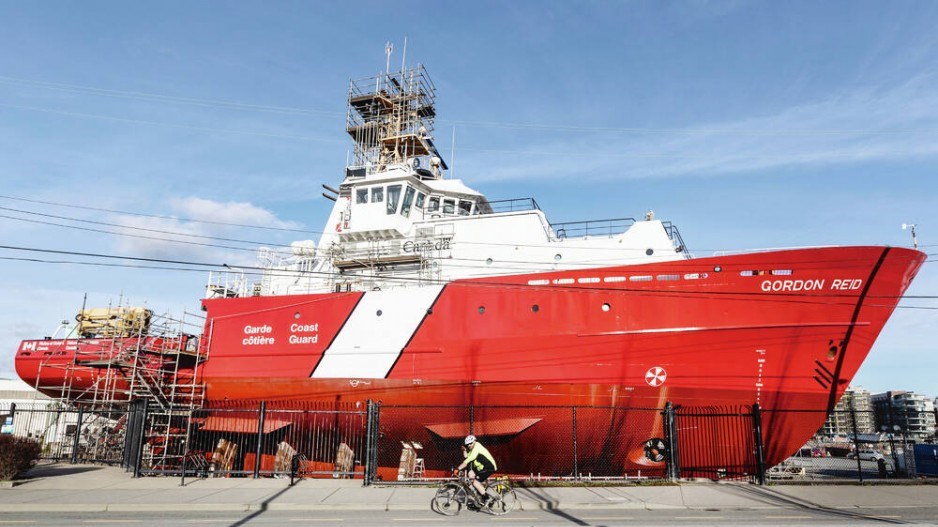An announcement of $2.5 billion in federal funding for construction of dozens of small vessels for the Canadian Coast Guard has caught the attention of Victoria’s Point Hope Maritime and other B.C. shipyards.
Federal funds will pay for construction of up to 61 small vessels.
Point Hope specializes in ship repair and maintenance, but general manager Richard Regosa said Thursday it plans to “explore this opportunity in more detail.”
“There may be elements of these new builds that we could combine with our activities in an innovative and collaborative delivery model,” he said.
The announcement was also welcomed by Chuck Ko, president of Allied Shipbuilders in North Vancouver, who said the company is “absolutely” interested in building vessels for the coast guard.
It would be prepared to look at anything between 300 tonnes and just under 1,000 tonnes, he said. Ko, too, is looking forward to getting more information about the plan.
As for the size of vessels Allied would be interested in, Ko pointed to the 54.7-metre CCGS Tanu, a fisheries patrol vessel, and the 39.7-metre CCGS Vector.
Allied is also hoping that contracts will include a large production run of lifeboats, he said.
Dave Hargreaves, senior vice-president of strategy, business development and communications at Seaspan Shipyards, one of the country’s few large shipbuilders, said the company is excited that the coast guard fleet is being revitalized.
The small-vessel build opportunity will further strengthen the “vast Canadian supply chain that has already seen tremendous growth as a direct result of the [National Shipbuilding Strategy] large-vessel build programs, on which Seaspan is a partner,” he said in a statement.
“It takes the combined efforts of a country-wide shipbuilding industry to rebuild a fleet and all of Canada’s shipyards will be onboard.”
A government statement says the small vessels will “play an important role in the safety of mariners in Canadian waters and will support essential Canadian Coast Guard services and operations such as science research, aids to navigation, environmental response and search and rescue.”
The plan calls for:
• Six mid-shore, multi-mission vessels
• One near-shore fishery research vessel
• Sixteen specialty vessels consisting of two special NavAids vessels, four special shallow-draft buoy tenders, four inshore science vessels, four special enforcement vessels, and two lake-class vessels.
• Four air cushion vehicles
• Thirty-four Cape-class search and rescue lifeboats
Construction of the vessels will provide opportunities for smaller Canadian shipyards and suppliers in Canada, and lead to well-paying jobs in the marine sector, the statement said.
The National Shipbuilding Strategy saw contracts for non-combat vessels, such as the Sir John Franklin, awarded to Seaspan in North Vancouver and construction of combat ships going to Irving Shipbuilding in Nova Scotia. In April, Chantier Davie, of Quebec, was named a third partner in the national program.
So far, 16 small vessels have been built for Fisheries and Oceans Canada and the Canadian Coast Guard, including 14 search-and-rescue lifeboats and two channel survey and sounding vessels.
The federal announcement follows B.C’s recent decision to allocate up to $25 million over three years to upgrade shipyards in the areas of shipbuilding, refit, repair and maintenance.
>>> To comment on this article, write a letter to the editor: [email protected]




